Filter by
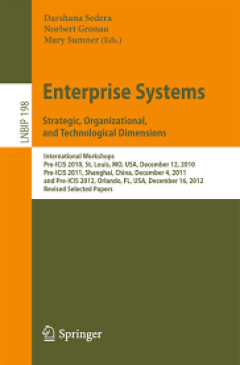
Enterprise and Organizational Modeling and Simulation 11th International Wor…
This book constitutes the refereed proceedings of the 11th International Workshop on Enterprise and Organizational Modeling and Simulation, EOMAS 2015, held at CAiSE 2015, in June 2015 in Stockholm, Sweden. EOMAS was founded with the purpose to become a forum among researchers and practitioners to share their research and practical findings by encouraging the dissemination of research result…
- Edition
- -
- ISBN/ISSN
- 978-3-319-24626-0
- Collation
- 83 b/w illustrations
- Series Title
- -
- Call Number
- -

Enterprise Systems. Strategic, Organizational, and Technological Dimensions …
This book contains 15 thoroughly refereed research papers selected from 90 submissions for the 5th, 6th, and 7th International Workshop on Enterprise Systems, Pre-ICIS 2010–2012, held in St. Louis, MO, USA, in December 2010, in Shanghai, China, in December 2011, and in Orlando, FL, USA, in December 2012, respectively. In addition, two invited papers complete this volume. The contributions …
- Edition
- -
- ISBN/ISSN
- 978-3-319-17587-4
- Collation
- 74 b/w illustrations
- Series Title
- -
- Call Number
- -
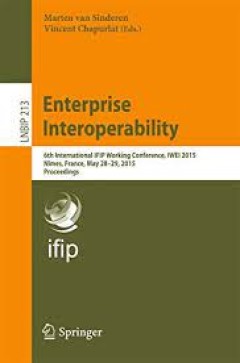
Enterprise Interoperability 6th International IFIP Working Conference, IWEI …
This book constitutes the proceedings of the 6th International IFIP Working Conference on Enterprise Interoperability, IWEI 2015, held in Nîmes, France, in May 2015. The event was organized by the IFIP Working Group 5.8 on Enterprise Interoperability in co-operation with INTEROP-VLab and PGSO (Pole Grand Sud Ouest) from INTEROP-Vlab. The theme for IWEI 2015 was “From Enterprise Interoperabil…
- Edition
- -
- ISBN/ISSN
- 978-3-662-47157-9
- Collation
- 73 b/w illustrations
- Series Title
- -
- Call Number
- -
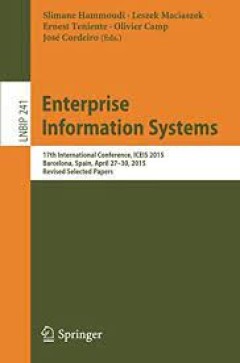
Enterprise Information Systems 17th International Conference, ICEIS 2015, Ba…
This book contains revised papers from the 17th International Conference on Enterprise Information Systems, ICEIS 2015, held in Barcelona, Spain, in April 2015. The 31 papers presented in this volume were carefully reviewed and selected from a total of 327 submissions. The book also contains one full-paper invited talk. The selected papers reflect state-of-the-art research that is oriented …
- Edition
- -
- ISBN/ISSN
- 978-3-319-29133-8
- Collation
- 263 illustrations in colour
- Series Title
- -
- Call Number
- -
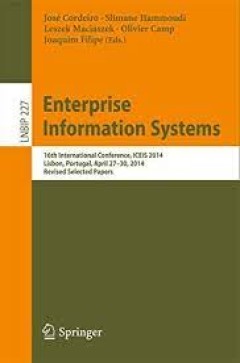
Enterprise Information Systems 16th International Conference, ICEIS 2014, Li…
This book contains extended and revised papers from the 16th International Conference on Enterprise Information Systems, ICEIS 2014, held in Lisbon, Portugal, in April 2014. The 24 papers presented in this volume were carefully reviewed and selected from a total of 313 submissions. The book also contains two full-paper invited talks. The selected papers reflect state-of-the-art research that…
- Edition
- -
- ISBN/ISSN
- 978-3-319-22348-3
- Collation
- 178 b/w illustrations
- Series Title
- -
- Call Number
- -
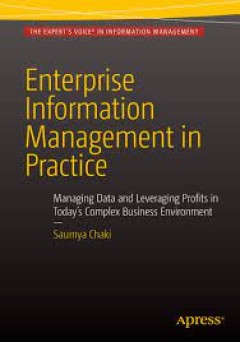
Enterprise Information Management in Practice Managing Data and Leveraging P…
Learn how to form and execute an enterprise information strategy: topics include data governance strategy, data architecture strategy, information security strategy, big data strategy, and cloud strategy. Manage information like a pro, to achieve much better financial results for the enterprise, more efficient processes, and multiple advantages over competitors. As you’ll discover in Enter…
- Edition
- -
- ISBN/ISSN
- 978-1-4842-1218-9
- Collation
- 76 b/w illustrations
- Series Title
- -
- Call Number
- -
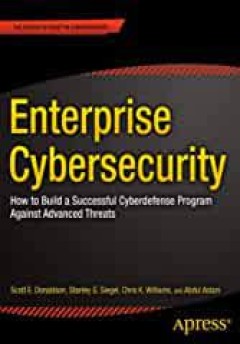
Enterprise Cybersecurity How to Build a Successful Cyberdefense Program Agai…
Enterprise Cybersecurity empowers organizations of all sizes to defend themselves with next-generation cybersecurity programs against the escalating threat of modern targeted cyberattacks. This book presents a comprehensive framework for managing all aspects of an enterprise cybersecurity program. It enables an enterprise to architect, design, implement, and operate a coherent cybersecurity pro…
- Edition
- -
- ISBN/ISSN
- 978-1-4302-6083-7
- Collation
- 223 b/w illustrations
- Series Title
- -
- Call Number
- -
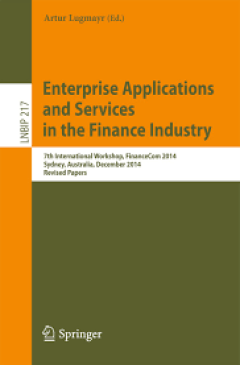
Enterprise Applications and Services in the Finance Industry 7th Internation…
This book constitutes the proceedings of the 7th International Workshop on Enterprise Applications and Services in the Finance Industry, FinanceCom 2014, held in Sydney, Australia, on December 12, 2014. The workshop spans multiple disciplines, including technical, service, economic, sociological, and behavioral sciences. It reflects on technologically enabled opportunities, implications, and…
- Edition
- -
- ISBN/ISSN
- 978-3-319-28151-3
- Collation
- 29 b/w illustrations
- Series Title
- -
- Call Number
- -
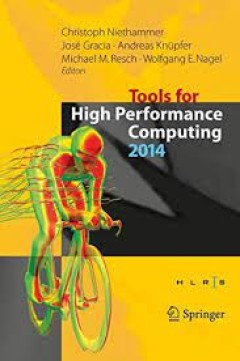
Tools for High Performance Computing 2014
Numerical simulation and modelling using High Performance Computing has evolved into an established technique in academic and industrial research. At the same time, the High Performance Computing infrastructure is becoming ever more complex. For instance, most of the current top systems around the world use thousands of nodes in which classical CPUs are combined with accelerator cards in order …
- Edition
- -
- ISBN/ISSN
- 978-3-319-16012-2
- Collation
- 18 b/w illustrations, 109 illustrations in colour
- Series Title
- -
- Call Number
- -
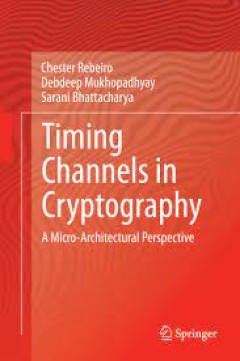
Timing Channels in Cryptography
This book deals with timing attacks on cryptographic ciphers. It describes and analyzes various unintended covert timing channels that are formed when ciphers are executed in microprocessors. The book considers modern superscalar microprocessors which are enabled with features such as multi-threaded, pipelined, parallel, speculative, and out-of order execution. Various timing attack algorithms …
- Edition
- -
- ISBN/ISSN
- 978-3-319-12370-7
- Collation
- 61 b/w illustrations, 14 illustrations in colour
- Series Title
- -
- Call Number
- -
 Computer Science, Information & General Works
Computer Science, Information & General Works  Philosophy & Psychology
Philosophy & Psychology  Religion
Religion  Social Sciences
Social Sciences  Language
Language  Pure Science
Pure Science  Applied Sciences
Applied Sciences  Art & Recreation
Art & Recreation  Literature
Literature  History & Geography
History & Geography